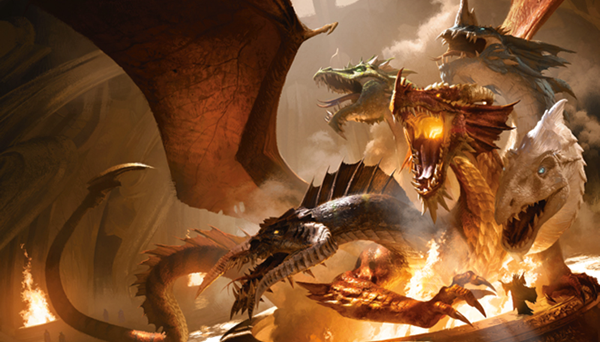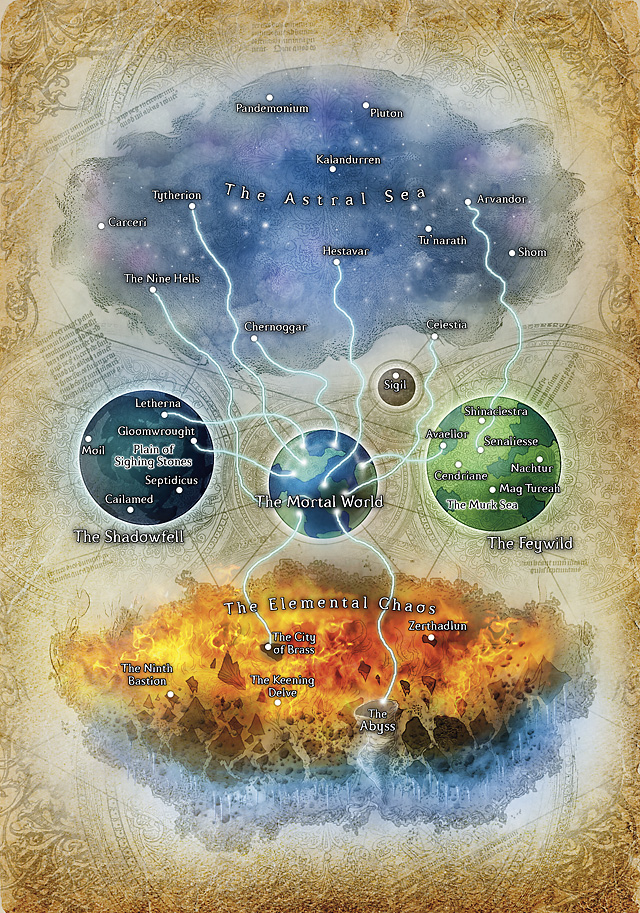Playing Gods
We DMs face many challenges. We have to keep track of our campaigns, make maps, improvise, brainstorm, and write adventures for sessions. When the session begins a whole new kind of work starts. Our brains switch from writers to performers. Much like a standup comic, we usually spend more time preparing for the performance than we do actually playing with friends. Yet it is those moments of performance and play the hours of preparation and worldbuilding pays off.
During that performance time DMs inhabit and play NPCs. Goblin bandits, snot-nosed trolls, elf nobles, human peasants, monarchs, and more are part of our one-person shows. We give them ticks, accents, mannerisms, and catchphrases to bring them to life and distinguish them in the minds of players.
Yet there are characters who are more daunting to inhabit than Hamlet’s Cladius. In the arc of many campaigns a DM might have to inhabit archfey, demon princes, primordials, ancient dragons, and gods. Putting on the skin of one of these powerful NPCs can be intimidating. Play it too small and your players will be unimpressed with the mighty being before them. Play it too big and your players will laugh at the over-the-top caricature you’ve created. Unless you play these mighty beings just right, you risk some major NPCs in your game not being taken seriously.

Tiamat – official fifth edition D&D’s most powerful NPC (for now).
Challenges of Playing Powerful NPCs
The daunting task of playing a powerful NPC can be broken down the following ways:
- They are smarter and less fallible than us. This isn’t a crack about your intellect. The simple fact is these powerful NPCs have the wisdom and knowledge that comes with living a millennia or longer. Their force of personality and confidence are proportionate with their amazing abilities. They can create and destroy with a wave of a hand or single breath. How can a mortal person like DM to the stars Chris Perkins, let alone a plebeian like myself, be expected to inhabit nigh flawless beings and make them believable? My face is nowhere near the level of Selune’s beauty, nor does it match the terror of an ancient red dragon’s visage so it’s all to be about the acting… Right?
- It’s hard to be scary, impressive, or intimidating. It’s especially difficult to be those things to friends you know well. When the PCs meet Bahamut or the Queen of Winter’s Court, you want the players to know they are before a mighty power, greater than any they ever faced. Of course when I give myself a fake Meryl Streep in The Iron Lady voice and pretend to be The Raven Queen, my players don’t react the way I want them to. They might feel the urge to cry but not from sheer overwhelming power. Rather that urge comes from the endless gales of laughter which have seized their bodies.
- We put off playing powerful beings. PCs don’t usually meet powerful NPCs until they are higher level at a time when the PCs themselves are approaching godhood. Of course the players are less impressed with these beings. (“You can stop time? So can I, bub.”) Some players might even feel challenged by the fact that a someone, even if that person is a god, is speaking down to them, since most other NPCs rarely do at this point in the game. These players often answer such remarks with their own condescension or jokes, which can really take the wind out of the sails of many a great DM. Waiting a long time to introduce a powerful NPC in the flesh presents another problem. Since they only pop up at higher levels and continue to appear infrequently, DMs don’t have as much experience playing these beings as we do run-of-the-mill villains, henchmen, and patrons. That lack of practice can be harmful to our attempts to play these mighty individuals. To make matters worse, these powerful beings are often talked up over the course of fifteen levels of campaign story before they appear. That means Orcus has hours of expectations, legends, schemes, and battles with henchmen to live up to when he finally meets the PCs for the first time.
- It’s easy to be cliche. My default for powerful beings used to be a deep voice, turns of phrase about shattering and/or saving the world, and using my DM authority to have the NPC “outsmart” the players at every turn. That meant there wasn’t much difference between Tiamat, Bel Shalor, Acerak, Kord, The Raven Queen, and every other powerful being the PCs met. Boring!
With all these pitfalls, you can see why some DMs (like me) are nervous when they wear the skin of a godly NPC. Well nineteen years of tabletop gaming has given me some tips about playing a powerful being I want to pass on.
Actions Speak Louder
I make television. One of the guiding principles of any producer working in the industry is, “Show. Don’t tell.” Rather than have the dragon boast about how she can fry adventurers to a crisp in a single breath, the PCs should witness her fire in action – melting stone in an instant or reducing a herd of cattle to ash. Gods can stop time and create or destroy matter with a snap of their fingers. Archfey can make a large oak grove spring forth from the ground with a wave of their hands. Before the PCs ever speak to a powerful NPC, set the stage with an awe-inspiring act beyond the capabilities of even level 20 character. Throughout the interaction, remember that these beings are more likely to demonstrate their power than boast about it.
Describe How Others React
Along the lines of showing and not telling, when a powerful NPC first shows up on the scene describe how other NPCs react to the being. Throngs of citizens and soldiers alike flee from the Tarrasque. The land’s mightiest warlord becomes a drooling puppy in the presence of the god of beauty. The way to the demon lord’s throne room is marked by groveling balors. Reactions like this demonstrate the might of these NPC to the players. If you can have a NPC the PCs trust and respect have a big reaction to a powerful being that is great way to impress the players. Imagine the players’ reactions to the strong, just king they have grown to love groveling for mercy at the feet of at the god of death. It’s a lot more moving than the god demanding the PCs kneel before him.
PCs Should Feel the Power
One mistake DMs can make is telling players they feel an emotion. Players can feel like their agency has been stripped away when you tell them, “You see Tiamat rise out of the Nine Hells and you now know true terror.” Unless a PC fails a saving throw against an effect like a calm emotions spell, DMs shouldn’t be providing an emotion for PCs to feel. That being said, I do think it’s fine for a DM to describe a PC’s physical reaction to a situation. The line is thin here, so let me give some examples.
The sheer power of one of these beings could make a person’s stomach churn or the hairs on the back of one’s neck stand. PCs could see an ancient red dragon breath fire a mile away, but feel an overwhelming burst of heat as if it were mere yards from them. Don’t go too far here. The description should be for flavor. PCs might feel their stomachs churn, but don’t make the characters vomit every time they see a demon prince (at least not without a saving throw). Again you want the players to feel the raw power of the presence before their characters, but maintain their own agency.
Introduce Them Early
If it works in your story, introduce a powerful NPC early. Think of all the video games like Skyrim and God of War where the hero meets the big bad and other major powers early in the story. Often the hero is too inexperienced and ill-equipped to take on the baddy or stand up to the gods, so their presence is far more intimidating than an initial meeting later in the game.
Meeting a powerful NPC can make an impression that lasts an entire campaign. If PCs meet the goddess of winter when they’re only level 1 and she freezes and shatters another NPC for insolence, your players will carry that image into every meeting with her thereafter.
Introducing a powerful NPC early in your game is good for you as the DM. It gives you more opportunities to role-play as the being which means you gain practice and confidence with every encounter you wear its skin.
Make Them Memorable
Like any NPC, you want to make the powerful ones memorable. Don’t rely on cliches like speaking with a deep voice and acting threatening or intimidating. Give them unique personalities. Use the NPC personality traits, ideals, bonds, and flaw tables in the Dungeon Master’s Guide to inspire original, creative characters. Maybe the god of the sun in your world is a young boy who is positive and playful, until the subject of the his sister and nemesis, the goddess of death, comes up. Then he turns dark and stormy. His hair changes color, his voice deepens, and his hands become angry, radiant fire. An ancient dragon might actually have a high, flutey voice and constantly talk about his impressive library, which he’s read all of twice. The Queen of Winter’s Court only communicates telepathically and her face always shows the opposite of her emotions. She scowls when she is happy and smiles when she is furious.
Don’t lean too hard on a powerful NPC’s flaws. Most gods, demon princes, archfey, dragons, and others are able to resist any temptation and outsmart any trap a mortal has to offer. These beings have lived a long time and are supremely confident, so save the moments they falter for later in the campaign when the PCs are higher level. If the PCs insight the event which lead the more villainous of these NPCs to fall, so much the better.
Let The Players Drive the Scene
When playing a powerful NPC, my first instinct is for that being to drive the scene. They see the PCs as bugs or pieces in a chess game, so they should take charge, right? Why should they care what the PCs have to say? That attitude can actually be quite boring for the PCs and again, it takes away their agency. Take some pressure off yourself, make the NPC’s introduction, and then allow the PCs to respond to the demands, pleas, or threats of the being. The NPC may be looking to answer any questions, start a fight, grant a quest, or take some other action, but always allow the players a chance to respond and ultimately decide where the scene goes. They’ll often take it to a place that surprises you and in the end they’ll respect that NPC even more.
If you like what you’re reading, please check out my podcasts on The Tome Show, follow me on Twitter, tell your friends and share this blog post, and/or leave me a comment and let me know you think. Thanks!


